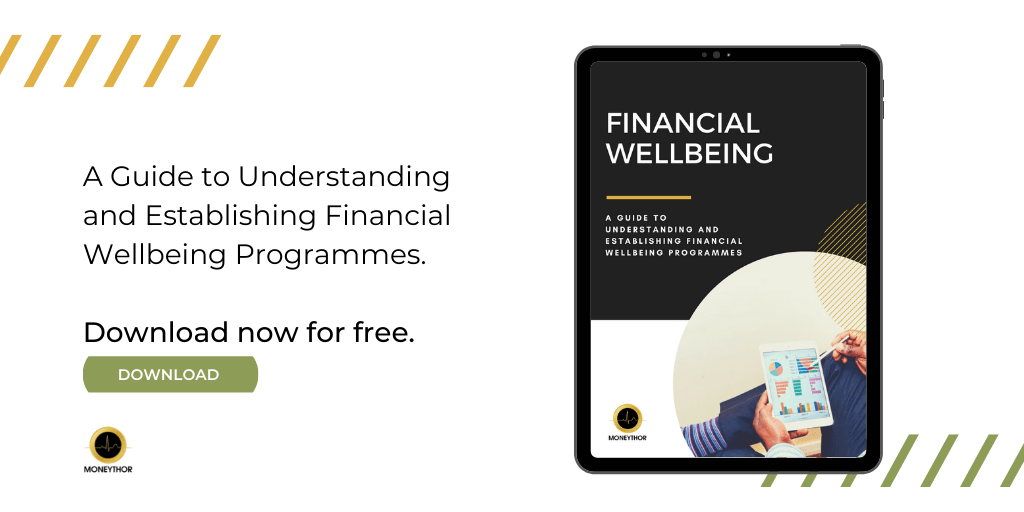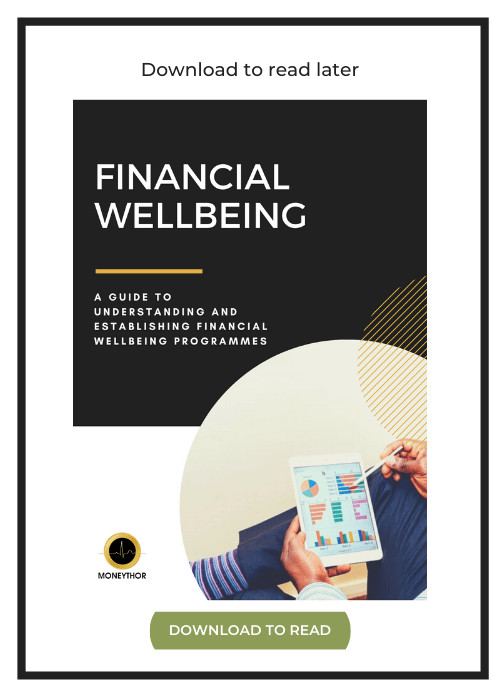経済的な幸福とは何でしょうか?
流行語として、ファイナンシャル ウェルビーイング (ファイナンシャル ウェルネスとも呼ばれる) は、最近誰もが注目するようになりました。この用語の意味を明確に定義したり、標準的な方法でまとめたりしたことがないため、この概念にはさまざまな尺度があります。全体的な考え方は、優れた金融リテラシーを持ち、自分の金融の健康とウェルビーイングをよく理解している人は、その理解によって選択の自由と日常生活におけるより大きな安心感が得られるため、全体的に幸せで自信に満ちているということです。
による 消費者金融保護局 米国では、経済的幸福は次のように定義されています 「日々、毎月の財政をコントロールでき、経済的なショックを吸収する能力があり、財政目標を達成する軌道に乗っており、人生を楽しむための選択を行う経済的自由がある状態。」
経済生活を効果的に管理すると、経済的な健康と幸福だけでなく、社会的、感情的な幸福も向上することが証明されています。財務計画と目標設定により、個人がお金に関して意図的な決定を下し、望ましい結果に向けて取り組むことができます。
新型コロナウイルス感染症による経済的影響も、金融機関と消費者の双方にとって、金融の健康が最優先事項となることに大きく寄与しています。このテーマが消費者の関心を集めるにつれ、銀行やフィンテック企業も時流に乗って、良い習慣を身につけるのに役立つコンテンツへのアクセスを提供し、消費者に責任ある手頃な金融サービスを提供することで、消費者が金融の健康を実現できるように支援する方法を模索し始めています。
ナッジ理論と経済的幸福
個人と金融機関の両方が、長期的な経済的ストレスが精神的および身体的健康、そして全体的な生産性レベルに悪影響を及ぼす主な要因であることを認識しているため、経済的な健康と幸福は急速に関心の高い話題になりつつあります。
消費者に、よりよい金融慣行を採用させ、行動を変えさせるにはどうすればよいでしょうか。ナッジ理論は、ナッジをポジティブな強化として提案する行動経済学の概念であり、個人の思考プロセス、意思決定、行動を徐々に改善する手助けとなります。ナッジは、個人がより良い習慣を身に付けるのを助け、個人の意思決定プロセスに良い影響を与えます。
金融の健康は、理解するのが難しい、または十分な知識や時間がないと思われるため、消費者にとって困難で達成不可能な偉業であると考えられることがよくあります。罰金は、より良い金融上の決定を下すための抑止力としてよく使用されますが、コストが発生し、意図しない悪影響をもたらす傾向があります。
一方、ナッジは個人の選択権や主体性を奪うものではなく、消費者が同じポイントに到達し、同じ意図した結果を達成するのに役立つ代替案を提示するものである。これはデフォルトとして設定することができ、タイムリーかつ便利でもある。これにより、 ナッジはツールとして非常に成功している 金融機関がより多くの消費者に経済的な幸福の実現を促せるよう支援します。
オープンバンキングと金融の健全性
エンドユーザーにとって、オープンバンキングがもたらす未実現のメリットは大きいです。 オープンバンキング さまざまなグローバル形態を通じて、消費者は、取引先の複数の金融機関にわたる財務状況を総合的に把握することができます。そのため、金融の健全性を促進するプログラムの展開を成功させる上で重要なツールとなっています。
オープン バンキングにより、金融機関だけでなく消費者もすべての銀行情報を一元的に利用できるようになります。銀行はこれまで以上にユーザーに優れた選択肢を提供するために努力しており、この統合により顧客の力が高まるでしょう。透明性により、消費者はどの商品が自分のニーズに最も合っているかを判断することもできます。さらに、すべての財務状況を詳細に把握することは、より金融に精通するための大きな一歩となります。
金融管理ツールとサービスの需要は、かつてないほど高まっています。デジタル専業銀行と金融サービスのデジタル化は、金融サービスと顧客との信頼関係と全体的な関係を構築することで、顧客に優れた体験を提供します。デジタル化は、オープン バンキングとともに、今日の消費者が享受している顧客サービスのレベル向上の原動力と見ることができます。
銀行は金融の健全性を促進するために何をしているのでしょうか?
金融機関は現在、消費者に単に資金管理のアラートを提供する以上のことを検討しています。銀行が金融の健全性を促進するためのアプローチを再考する主な理由は、良好な金融習慣の定着性です。消費者は、新しい行動につながる価値あるコンテンツや洞察を継続的に提供されれば、変化して新しい金融管理手法を採用する可能性が高くなります。
誰もが独自の目標、ニーズ、要件を持っており、それらは時間と状況によって変化します。金融機関は、消費者の経済的幸福に対処するために、より個人的かつ包括的なアプローチを取ろうとしています。なぜなら、そのようなプログラムに投資することは、個人にとって真の金融ガイドとしての地位を確立するのに役立つだけでなく、金融機関に対する顧客ロイヤルティとエンゲージメントを促進することが証明されているからです。
オンラインインタラクティブコース
銀行は、一定期間にわたってエンドツーエンドのオンライン コースやパーソナライズされたコースを実施し、こうしたプログラムに関心のある顧客を指導して、実用的なアクティビティ、金融に関するヒント、タイムリーな課題を提供し、経済的な幸福を達成するために必要な手順を理解できるように支援することができます。これにより、顧客は経済的な幸福を発見する旅に出ることができ、こうしたガイド付きのアプローチによって、金融習慣の改善につながることが期待されます。
この良い例は、 オーストラリア オーストラリアとそのオンライン ANZ ファイナンシャルウェルビーイングチャレンジ 消費者は、経済的に健全になる方法に関する指導、ヒント、情報を受け取るためにサインアップできます。この無料のメール チャレンジは、参加者が支出を計画し、負債を管理し、貯蓄目標を設定し、投資を始めるのに役立ちます。銀行がこのプログラムに設定した 6 週間のタイムラインは、経済的に健全になるきっかけを作るだけでなく、長期的に個人により良い財務習慣を植え付けることを目的としています。
透明性を高めるための共同エコシステム
消費者が金融リテラシーの習得を妨げている理由の 1 つは、取引先の金融機関間での透明性の欠如と情報の分断です。これにより、消費者は自分の財務状況を確実に把握することができません。
シンガポールでは、 DBS その DBS NAV プランナー サービスは、ユーザーにパーソナライズされた財務計画機能を提供するデジタルアドバイザーになることでこの問題に対処しています。これらの機能は最近、オープンバンキングのローカルバージョンである SGフィンデックス これにより、個人は自分の財務状況をすべて確認し、預金、クレジットカード、ローン、投資、さらには不動産資産の残高などの情報を 1 つのビューで確認できるようになります。
この包括的な概要は、消費者に力を与え、個々の財務上の決定が全体的な状況にどのような影響を与えるかを理解するのに役立ち、それによって消費者が財務上の健全性を達成するための道を進むのに役立ちます。
消費者にとってのさらなるメリットは、同意があれば、すべての銀行が技術的に同じ集約情報にアクセスできることです。そのため、金融サービスプロバイダーにとっては、マーケティング効果を高めるだけでなく、顧客に提供する価値を真に向上させるためにそのデータを使用する競争とインセンティブが高まります。
パーソナライズされた金融サービス
金融サービスの急速なデジタル化は多くの人にとって歓迎すべき側面ですが、一部の消費者は依然として、財務管理に関しては人間とのやり取りや個人的な対応を好みます。個人向け銀行業務に関しては、人間的な要素が依然として非常に求められています。
ヨーロッパでは、 アイルランド銀行 は、消費者が経済的な健康を達成できるよう、2つのアプローチを採用しています。オンラインの 経済的な幸福の健康診断 同社のウェブサイトには、消費者が次のステップに進み、財務状況を改善するために何ができるかについてファイナンシャルアドバイザーに相談するオプションもあります。また、貯蓄の始め方、パンデミック中の財務管理方法、個人が自分では見つけられないかもしれない税制優遇や減税に関する情報など、豊富な記事ライブラリも提供しています。
消費者がリベートや特典を発見できるよう支援
2020 年は多くの人が職を失い、企業が閉鎖する年でした。世界中の政府や金融機関は、消費者や企業の経済的負担を軽減するために、この時期に所得支援や救済を強化しました。しかし、自分がどのような給付を受ける資格があるかを知るためのプロセスは、困難なものになる可能性があります。
オーストラリア・コモンウェルス銀行 提供 メリットファインダー 消費者が割引や払い戻し、さらには税金控除の対象となるかどうかを知るのに役立つ。もともとは消費者が新型コロナウイルス感染症の影響を受けたフライトの払い戻しを処理するためのシステムとして始まったものが、今では非常に便利な金融福利厚生ツールに発展した。個人および法人向け銀行業務の両方に適用できるため、パンデミック中およびパンデミック後にどのような特典を利用できるかを全般的にユーザーが理解するのをサポートする。
行動銀行になる
金融機関が行動科学の手法を活用して経済的な習慣を改善できることを発見したことで、行動科学の手法が注目を集めています。そして、これらの手法を金融福祉プログラムの文脈で使用することは、現在、世界中の金融機関の課題となっています。
南アフリカの ディスカバリー銀行 自らを最初のブランドとして 行動銀行 金融の健康を中核かつ指針として開始されました。Vitality プラットフォーム内に組み入れられ、模範的な銀行取引習慣を促進し、貯蓄と投資を生み出す金融上の意思決定を奨励します。
責任ある金融決定に対するインセンティブに加え、健康的な食事と運動に対する報酬も消費者に提供しています。最も重要なのは、国を社会経済的に前進させるために、負債を減らし、より健康的な貯蓄習慣を育むための国家的な取り組みの必要性を概説していることです。ディスカバリー銀行は、世界中の同業他社と同様に、金融機関と個人とのデジタル関係がどのようなものになるかを再考し始めています。これは、単に経済的な幸福を達成するためだけでなく、個人の全体的な幸福を実現するためです。
結論
経済的な幸福は、退職後だけでなく、生涯にわたって続くものです。金融機関は、経済的な幸福を確保することは個人の責任以上のものであることを理解しており、消費者が短期および長期の財務目標を達成するための適切なツールを確実に利用できるようにすることに注力し、デジタル バンキング チャネルの機能を強化しています。
Moneythorはどのように役立ちますか?
Moneythor は、金融機関の記録システムとデジタル チャネルの間に位置するオーケストレーション エンジンを提供し、エンド ユーザーにとって魅力的でカスタマイズされたエクスペリエンスを実現します。インタラクティブな金融ウェルビーイング プログラムの展開をサポートする、すぐに使えるサポートを備えた構築済みのユース ケースを提供します。
Moneythor ソリューションを利用すると、銀行や FinTech 企業は、顧客の財務健全性を向上させるために設計されたパーソナライズされた洞察、実用的な推奨事項、状況に応じたナッジによって、提供するデジタル エクスペリエンスをアップグレードできます。
金融福祉プログラムを展開する際に、Moneythor ソリューションは次の点で役立ちます。
- オープン バンキングにより、複数の銀行を含むすべての資産と負債にわたる財務状況を顧客に総合的に把握してもらいます。
- 顧客のデータを充実させ、お金がどこに使われているのかを顧客がより深く理解できるようにします。
- 顧客が達成すべき目標とマイルストーンを設定し、長期にわたるプログラムと課題を推進します。
- 財務状況の改善に向けて進んでいる顧客に報酬を与えます。
- さまざまな対象者に合わせた、パーソナライズされた金融リテラシーのヒントで教育します。
- もっと!
更新日: 2022年4月26日。
金融の健全性を理解するガイドをダウンロード
「*」は必須フィールドを示します


